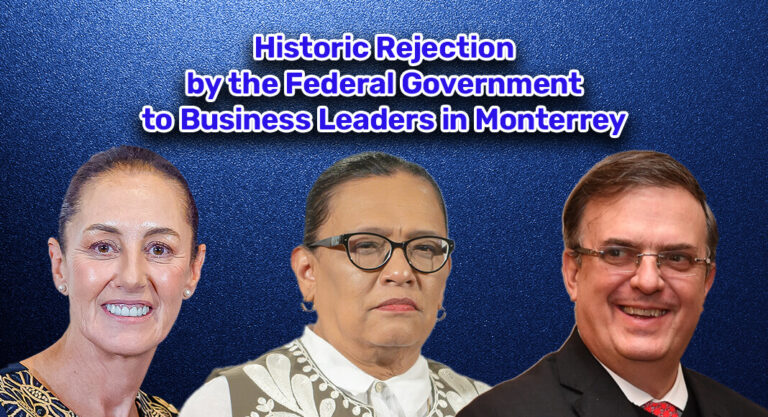Claudia Sheinbaum, President of Mexico. Photo: Ricardo Stuckert, CC BY-SA 2.0, via Wikimedia Commons.
Rosa Isela Rodríguez, Secretary of the Interior; Photo credit: EneasMx, CC BY 4.0, via Wikimedia Commons.
Economy Secretary Marcelo Ebrard. Photo courtesy of the U.S. Department of State, public domain.
texas border operations
– Advertisement –
In an unprecedented event, more than 1,000 business leaders from across the country gathered in Monterrey, Nuevo León, for the Annual Meeting of Businessmen, an important forum for Mexico’s economic agenda. The event, held on October 21, 2024 at the Cintermex Convention Center, brought together the country’s main chambers of commerce under the Confederation of Chambers of Industry (CONCAMIN). With the hopeful theme of “Industry as a Engine of Prosperity and Well-Being,” the entrepreneurs discussed the challenges and opportunities facing the Mexican economy, especially in light of global phenomena such as nearshoring and nearshoring. Sheinbaum was eager to engage in dialogue with the newly formed government. Revision of USMCA.
But the atmosphere quickly became somber. No one attended the event, despite the announced participation of several ministers, including Economy Secretary Marcelo Ebrard and Interior Secretary Rosa Isela Rodríguez. President Sheinbaum was scheduled to lead the opening ceremony, but he was one of the day’s major absences. Major lectures and panel discussions had to be canceled or rescheduled due to the absence of official government representatives.
The most notable blow was the cancellation of Ebrard’s keynote address on “Mexico Facing the Challenges of World Affairs,” a topic important to businessmen seeking to position Mexico in international value chains. . Instead, Ebrard sent a short 59-second video message, which was interpreted as a sign that the new government was not interested in strengthening ties with the manufacturing sector.
– Advertisement –
The disappointment of those in attendance was palpable. Business leaders such as Alejandro Malagon, President of CONCAMIN, Francisco Cervantes, President of the Business Coordinating Council, and Máximo Bedoya, President of CAINTRA Nuevo León, consult with authorities on important public policies that directly affect the future of the country’s economy. I was hoping to get it replaced. Instead, they faced an institutional vacuum. The disrespect felt like a shower of cold water on an event that brought together more than 500 business leaders representing 46 national and 14 local chambers.
The implicit message from the government was clear. Your priorities are elsewhere. Not only was a valuable opportunity to strengthen dialogue with the productive sector missed, but it also sent a worrying signal of distancing at a critical time for the national economy. Businessmen account for 85% of the country’s total investment, while the public sector accounts for only 15%. As the country faces the possibility of recession in 2025, government support for those who create jobs and drive growth is more important than ever.
Unofficial accounts soon began to circulate, but whatever the reason, the government’s absence left a bitter feeling among those present.
This disrespect has immediate implications and calls into question the future relationship between Claudia Sheinbaum’s government and the private sector. Former President Andrés Manuel López Obrador has had his share of disagreements with business leaders, but he has never seen such blatant indifference. Mexican businessmen, whose primary responsibility is to invest in infrastructure, innovation and job creation, were hoping for an approach that would engender confidence in this new political cycle. Instead, they received a message of indifference that could impact the country’s investment climate.
– Advertisement –
Basic diplomatic protocol would have required at least one minister to represent the new government at this important event. But that diplomacy must happen. This raises the question of whether the Sheinbaum administration is leaning toward interacting with large corporate conglomerates or distancing itself from the companies that have long been the driving force behind the country’s economy.
Monterrey’s disconnect is a worrying sign. At a time when the global economy faces unprecedented challenges and Mexico has an opportunity to leverage nearshoring, dialogue between governments and the private sector is more important than ever. Ignoring businessmen is not only a strategic mistake, it also creates uncertainty about the country’s economic path in the coming years.
– Advertisement –
Source link


